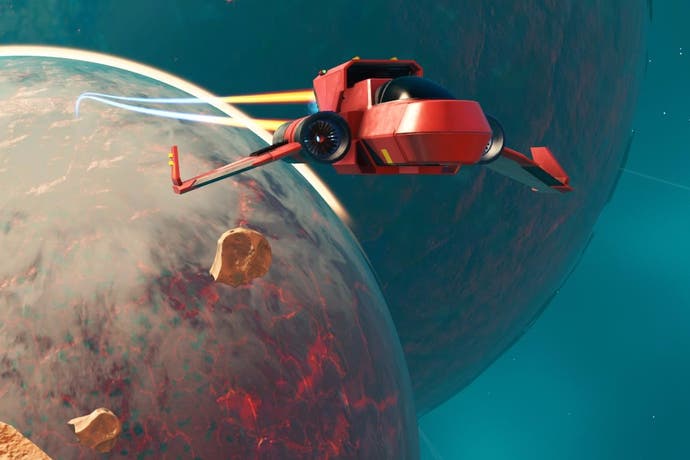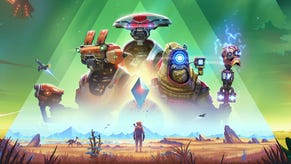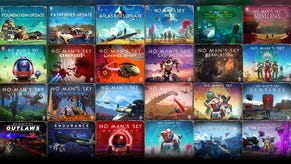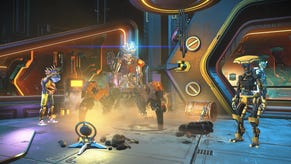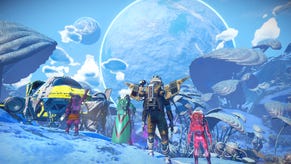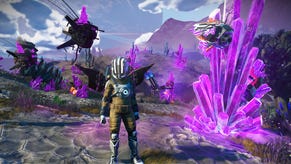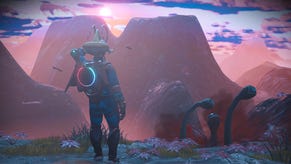One year on, is No Man's Sky the game it should have been?
Atlas scrubbed up.
When I fired up No Man's Sky last week, with an eye on today's anniversary of its release, my save file showed that the last time I played the game was in late August last year. I had reviewed it and kept playing for a couple of weeks afterwards; despite the storm of controversy and disappointment that raged around the release of Hello Games' sci-fi exploration game, some of it justified, I had enjoyed myself. It struck me as a hypnotic curio, built on moonshot technology, that deserved neither the slating it got nor the outsized hype that had raised expectations of it to the realm of fantasy.
It was a sorry state of affairs. Everyone had been complicit in building that hype - and I do mean everyone. Sony, who must have known that the game was at best an unconventional proposition, couldn't resist the pull of its dazzling PR hooks - an infinite universe, created by a small team with the power of PlayStation 4! - and drove it straight into the mass-market consciousness (where it really didn't belong) with marketing that painted it as a glossy triple-A blockbuster, as Skyrim in space. Hello's Sean Murray bought his own hype and made promises - or at the very least, suggestions - in interviews that he must have known, deep down, that his team would not be able to keep. We in the media (even The New Yorker, for heaven's sake) ate all this up and signal-boosted it, too seduced by a sexy story to pose the right questions or use the filter of scepticism and experience that it is our job to apply. And the gaming community worked itself into a frenzy of entitlement that clouded its vision to the extent that it struggled to take the game itself at face value.
We were all at fault, and we were all victims too. Murray and his team had a huge sales hit on their hands, but their reputation was in tatters and they were beset by appalling harassment; gamers had paid for a game which was manifestly not the game that had been sold to them; the press had taken Murray's words on trust and had its own credibility dented. (Well, almost all victims - Sony racked up lots of sales and then rapidly distanced itself from a game that, it said, had always been an indie and thus not really its responsibility.) Everyone got what they deserved and nobody did.
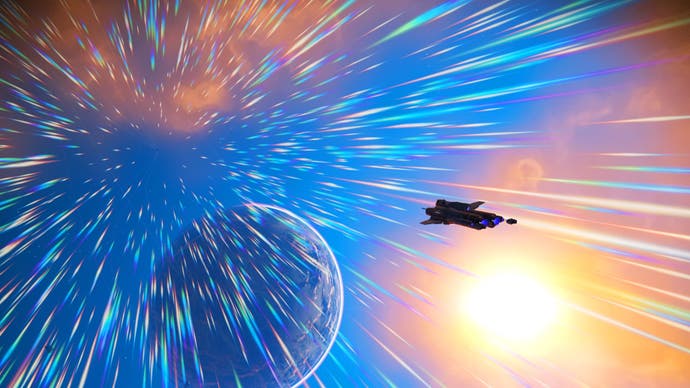
No Man's Sky wasn't what it was promised to be, but it was no fraud; it had issues, but it was no disaster. It was, however, a somewhat empty game. It could suck you in with its sense of mystery and discovery, its virgin vistas, the momentum of its journey to the heart of the universe and - less romantically, but most effectively - its well-drilled gameplay loops of farming and crafting. But it could lose you, too, with its thin, gnomic storytelling and lack of clear long-term goals. After a while it started to feel like a very pretty galactic treadmill, and I drifted away.
Hello Games didn't, though. Out of necessity, the developer pulled the plug on social media, PR, interviews and all but essential communication with the game's community. Then it went to work. It ploughed everything back into the game, releasing two very substantial free updates over the course of the last year. November's Foundation update added a big, flexible base-building system, the ability to acquire star freighters, and a tough Survival mode. March's Path Finder update brought ground vehicles and ship and weapon specialisation. There were many interface, tech and quality-of-life improvements, dozens of new crafting materials and recipes, rafts of bug fixes, and the game got a much-needed photo mode.
It's not only the game that has changed. A year ago, online discussion around it was toxic. Log into its most popular Subreddit today and you'll find a quieter space, but one buzzing with positivity. In particular, the No Man's Sky community has been enthusd by an involved promotional alternate reality game, or ARG, that started with cassette tapes being sent to fans in the mail and concluded with a teaser for a third major update. We now know that update, Atlas Rises, will release this week, and focuses on improving the game's storyline as well as adding a fast travel system using Stargate-style portals.
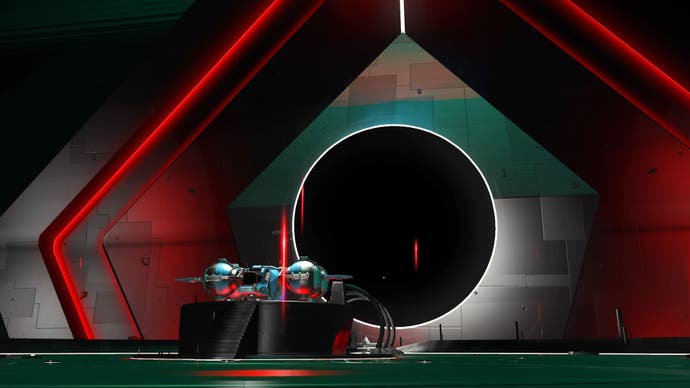
Coming back to No Man's Sky after 11 months and catching up on Foundation and Path Finder in one go, I found the game improved, expanded, but not transformed. No Man's Sky needed more to do, and it now has that in spades: with Exocraft (the land vehicles), the ability to own multiple starships with different specialisations and, especially, base-building, the number of upgrade paths has proliferated and the endgame ceiling has been pushed out to the stratosphere. For a certain kind of video game collector, it's soothingly compulsive stuff. The network of resources and crafting recipes has been expanded and deepened a little, the game's systems still fit together pleasingly, the Exocraft make planetary exploration less of a trudge. The work Hello has done on quality of life has more than kept pace with the game as its feature set has mushroomed, so things like inventory management niggle less than they used to, even though there is more to cope with.
But - assuming you have completed the frustratingly opaque 'Atlas path' storyline and reached the centre of the universe once - No Man's Sky remains a fairly broad and shallow game of acquisition and not a lot else. It's fun to build a giant base, upgrade your Exocraft and assemble a top-flight collection of starships, but why are you doing it? In a way, these fulsome and feature-rich updates turn the concept of the game on its head. To begin with, you gather and craft in order to explore, but once you get into base-building, upgrading and collecting, you explore in order to gather and craft. You jump between star systems to find a particular resource or recruit an alien specialist for the terminals at your base - and then you jump back.
This is perhaps the most meaningful change to the game, and it's a double-edged sword. The most unique thing about No Man's Sky was the way its vast, algorithmically-generated universe combined with its warp-scavenge-repeat gameplay to create an experience of continual discovery and also continual departure. It was a game in which you were very unlikely to need - or even be able - to retrace your steps. As I wrote in my review, "never look back, because everything left behind is gone forever, while nothing ahead has been seen before."
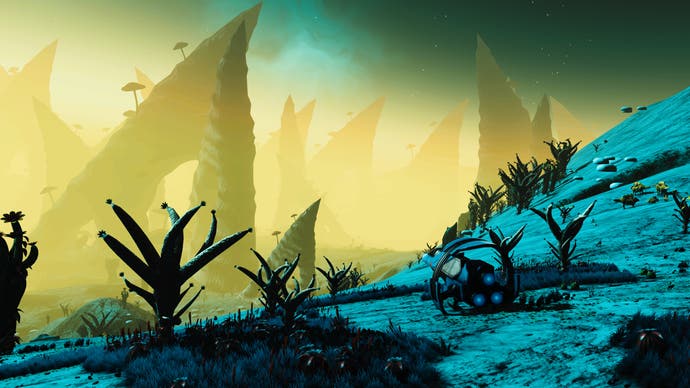
Now your base comes equipped with a teleporter that will zap you back to the last space station you visited, even if it is hundreds of light years away, and vice versa. If you find a system you want to return to, you can leave a beacon there that will make it easier to navigate back. The first of these is essential for the base-building systems to work smoothly, but it comprehensively breaks the sense, so carefully constructed and well communicated by the base game, of interstellar travel as a precarious enterprise in which you can't afford to ever not be moving forwards. It trivialises distance, while the rest of the game does everything it can to make distance something you fear and feel.
So building up your presence in No Man's Sky is fun and rewarding, but thematically troublesome. The opposite is true of Survival mode. I was excited to try this, as at launch the game's survival elements were gentle, but added a distinct edge. I thought a more difficult survival mode with greater penalties for death could harden the core of the game in exciting ways, giving both its systems and its spacefaring theme more bite. But it just doesn't work. It's not balanced well, it doesn't play nicely with the algorithm, it presents its biggest humps right at the very start - and it underscores how lightweight the game's systems really are. As the framework for an explore-and-collect chillout, they work fine, but as the core of a hard survival game, they don't give you enough to sink your teeth into, and as a result, it's a slog.
This sounds more downbeat than I mean it to. I still like No Man's Sky; I'm easily transfixed by its laid-back rhythms and still wowed by its vast universe and bold aesthetic. I'm very impressed by the work that Hello has done on it in the past year to make it more welcoming and adaptable to different playstyles, and I've been diverted by the wealth of new additions. They make it a better, richer game, but I don't think they close the gap between the game it is and the game Sean Murray, Sony's marketers, and the moon-eyed press and public tried to will into being last year. And that's OK, because that game was never real and might even have been less interesting and idiosyncratic than the game we actually got.
I still sense another gap to close, though, between No Man's Sky as it is now and the game it is genuinely striving to be. It's a gorgeous prog-rock-album-cover generator and engrossing space exploration sim, but it still has a certain hollow aimlessness at its heart, a sense of something missing. A storyline that makes any kind of sense would be a good start. A still deeper faction system might make the amusing interactions with the three alien species more meaningful. And there's still that promise, never ruled out by Hello Games, that you might, unlikely as it may be in the vastness of space, come across another player. More than new crafting and upgrade paths, it's things like this that will fill the hole in No Man's Sky's heart: humanity; contact; a sense that there's something to look for, that there's someone out there. I'm hopeful that Atlas Rises will take big steps in that direction this week, and I'll report back soon. We're not done exploring the galaxy yet.
